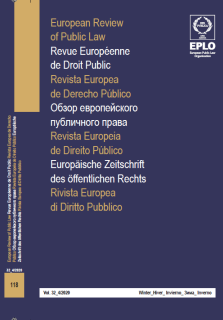
Constitutional Law / Droit constitutionnel
2020
Poland / Pologne
Professor at Jagiellonian University in Krakow, Chair in Comparative Constitutional Law
and Centre for Interdisciplinary Constitutional Studies, e-mail: g.kuca@uj.edu.pl
Professor at Jagiellonian University in Krakow
PhD, Assistant at Jagiellonian University in Krakow
The year 2020 was a special one for Poland, the countries of the region and of the world. The outbreak of COVID-19 confronted the world with a crisis, the consequences of which will certainly exceed those of the financial crisis at the beginning of the 21st century. Concern for the health and life of citizens, as well as the need to ensure extraordinary financial resources, led the ruling majority to adopt a very specific approach to dealing with the effects of the COVID-19 pandemic, which contributed to a further deterioration of the rule of law. As a result of the circumstances Poland faced when holding its presidential election, for the first time in history, the country did not hold the election on the scheduled date. The government continued to use recent legislation to harass independent judges and took a number of measures to prevent the legal status of judges appointed by the unconstitutional National Council of the Judiciary from being challenged.
L’année 2020 a été une année particulière pour la Pologne, les pays de la région et ceux du monde entier. L’épidémie de COVID-19 a confronté le monde à une crise dont les conséquences dépasseront certainement celles de la crise financière du début du XXIe siècle. Le souci de la santé et de la vie des citoyens, ainsi que la nécessité d’assurer des ressources financières extraordinaires, ont conduit la majorité au pouvoir à adopter une approche très spécifique pour faire face aux effets de la pandémie de COVID-19, ce qui a contribué à une nouvelle détérioration de l’Etat de droit. En raison des circonstances auxquelles la Pologne a été confrontée lors de la tenue de son élection présidentielle, pour la première fois dans son histoire, le pays n’a pas organisé l’élection à la date prévue. Le gouvernement a continué d’utiliser la législation récente pour harceler les juges indépendants et a pris un certain nombre de mesures pour empêcher la remise en cause du statut juridique des juges nommés par le Conseil national de la magistrature, organe inconstitutionnel.





















